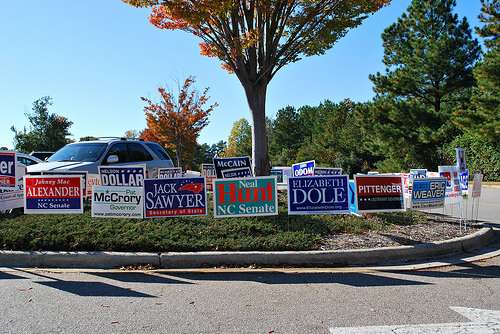Professor Sues Town Over Yard Sign Free Speech

Frustrated by demands from town officials, one professor is suing his local government for violating his First Amendment rights by harshly regulating political yard signs.
David Rubin's struggle began in 2006 when government workers of Manlius, New York, told him to remove political signs from his yard.
Rubin is no stranger to free speech issues. He is the former dean of Newhouse School of Communications and current First Amendment law professor at Syracuse University. On Tuesday, the Center for Competitive Politics (CCP), a non-profit, filed a lawsuit on the professor's behalf.
According to his hometown's code, "in order to preserve aesthetics and ensure traffic safety," Rubin cannot express his political views on a sign more than 4 square feet. Likewise, he cannot display the sign for more than 30 days before an election or 7 days after. Even if the resident accepts these limitations, Manlius still requires him to get permission from the town clerk in the form of a permit and registration.
"I agree that beautification is important for a town to be concerned about." Rubin told WSYR, a local channel. He added, "It is not as important as free speech."
He pointed out that City of Ladue v. Gilleo, a 1994 U.S. Supreme Court case about yard signs and free speech, acts in his favor.
I spoke to William R. Maurer of the Institute for Justice, who said this is part of widespread and alarming mindset among local governments:
This is unfortunately part of a trend across the country. They believe they don't need to have a good idea of what the Constitution requires, what they're limited to do, and the rights that people possess both in property and speech. We expect cops on the beat to know about the Fourth and Fifth Amendment. Employees of these municipal departments don't seem to think the Constitution until after being explicitly told you can't do this. It's not a good basis for a civil society.
Maurer added that, "the government must have a really, really strong reason to stop people from engaging in political speech on their own property. I haven't seen this municipality come up with any justification."
The CCP's press release about the case points out the discriminatory nature of the suburb's code:
The Manlius law and permit requirement are particularly problematic because they are content-based: they single out just one type of speech for prohibition and regulation, namely political expression via lawn signs.
WSYR adds to this point: "For example, real estate signs can be up for months before a property sells as long as it doesn't pose a public safety hazard."
Ed Theobold, the Town Supervisor and one of the defendants in the case, "was surprised by the lawsuit and hopes it can be resolved quickly," according to WSYR, despite admitting that the town never actually responded to Rubin's initial complaint.


Show Comments (32)